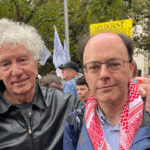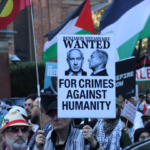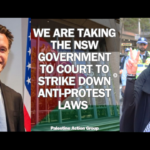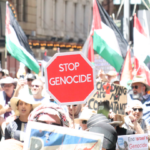Appeals Court Prohibits Pro-Palestine March to Opera House, But Organisers Confirm New Route
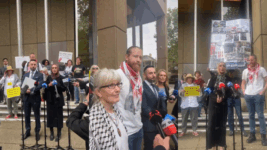
The NSW Court of Appeal has issued a prohibition notice against the 12 October 2025 Palestine Action Group rally, that sought to march across Gadigal land from Hyde Park North to the Sydney Opera House this Sunday. But the protest that seeks to mark two years since the Israeli state commenced an unbridled massacre against the Palestinians of the Gaza Strip will proceed.
Following the ruling on Thursday, Palestine Action Group spokesperson Damien Ridgewell announced in front of the Law Court Building in Queens Square that their continues to be a legally approved Palestine Action Group rally taking place, as part of a national day of action, on 12 October 2025 at 1 pm, which will meet in its normal position in Hyde Park North and march through the Sydney CBD.
“We will be marching through the city, down George Street. We are going to fill George Street with people demanding an end to this genocide and an end to the trade of military hardware and equipment to a country, which has killed hundreds of thousands of people in the last two years, and tens of thousands of children,” Ridgewell made certain.
The NSW police commissioner launched the court challenge against the Palestine solidarity march, which is part of an ongoing two-year-long mobilisation by Sydney civil society against the recently UN-recognised genocide in Gaza, and Justice Stephen Free cited safety concerns in respect of demonstrators gathered at the Opera House, as he presented the ruling at 9.30 am on 9 October.
This is the third challenge the NSW Police Force has launched against the Palestine Action Group protests over the last two years. The first resulted in a negotiated agreement, the second permitted hundreds of thousands to march across the Sydney Harbour Bridge in opposition to the genocide. However, this third round of court proceedings has gone to the villain: the NSW state.
A public safety concern
“The public safety risk to participants and other members of the public is extreme,” said Justice Free on Thursday morning. “The forecourt that would be taken on the proposed procession contains a number of pinch points, which would give rise to the risk of crowd crush as the route narrows, particularly as it approaches the Opera House forecourt.”
“A particular issue of concern is egress from the forecourt,” his Honour continued. “On the basis of the estimated crowd, assuming that the estimate was accurate and reliable, egress back via Macquarie Street would not be possible as it would involve turning the march back on itself. Egress along the corridor adjacent along Circular Quay would be problematic.”
The three-justice bench, which further included NSW Chief Justice Andrew Bell and Justice Ian Harrison, also noted that the third egress, or ability to leave, involved small openings into the Royal Botanic Gardens. Although, these were the same types of risk that were considered in August in respect of Palestine Action Group having successfully sought to march across the Harbour Bridge.
Palestine Action Group has suggested that 40,000 marchers will take part in this weekend’s action. The Harbour Bridge March for Humanity on Sunday 3 August did involve hundreds of thousands of protesters having to turn back around on reaching the far side of the bridge and march back across it. This was a concern that was thought to be more problematic on the route to the Opera House.
“The Court of Appeal was unanimously of the view, that given the size of the crowd likely to participate in the procession and public assembly and given the route and in particular, the capacity and other physical constraints of the proposed destination of the procession, the public safety risk to participants and other members of the public is extreme,” Justice Free said in delivering the ruling.
The right to protest under attack
“We have heard a lot about how the Opera House forecourt can only hold 6,000 people,” Ridgewell continued in Queens Square on Thursday morning, “well, 19,000 Palestinian children have been killed by the Israeli military over the last two years. It is time for our government to show that it stands on the side of those people who have lost their lives in this horrific genocide.”
“Obviously, the court proceedings did not go our way today, and we won’t be marching to the Opera House,” the long-term advocate for Palestine continued. “But we know the courts often gets things wrong, that is why we have appeals, and it also highlights the need for urgent legal reforms around the rights to protest.”
NSW lawmakers had increasingly been impinging upon the rights to protest over the eleven years of Coalition rule that ended with the Perrottet government being voted out in March 2023. However, this was eleven months after it had progressed the most draconian antiprotest laws the continent has ever seen, and NSW Labor, the current government, helped wave them through.
The laws that were passed in March/April 2022 target those participating in unauthorised protests that obstruct major bridges, tunnels and roads in Greater Sydney, Newcastle and Wollongong, along with a list of major facilities, with maximum penalties of 2 years imprisonment and/or a fine of $22,000 applying. Severe laws like these have since been passed in Tasmania, Victoria and SA.
To the chagrin of much of its supporter base, Labor didn’t just assist the Liberals in stamping out a spate of successful unauthorised climate protests in NSW in early 2022, but the Minns government has been keen to eradicate normal streets protests, as its recently provided police officers with the power to move on protesters near places of worship, with “near” left up to their discretion.
“Our right to protest is paramount in a democratic society,” added Ridgewell. “The campaign in solidarity with Palestine has absolutely been an example of why we need to enshrine the right to protest in our legal system, so that people who are trying to use our democratic rights to stop genocide are not facing constant attempts to block them by police and political institutions.”
Marching to stop genocide
Lawyer for Palestine Action Group Nick Hanna explained to reporters in Queens Square on Wednesday this week that his clients had also submitted an affidavit from Australian international human rights law expert Chris Sodoti on Israel’s progression of a genocide in Gaza and based on this, it was further asked that the NSW court make a finding on whether genocide is in progress in Gaza.
The NSW Chief Justice queried the defendant’s barrister Felicity Graham in respect of proceeding with the determination on whether the Gaza genocide should be made. The prosecution suggested the court didn’t have the ability to make such a finding, but it considered that it could make a determination on whether the protest participants do actually believe a genocide is occurring.
Graham underscored that a ruling on whether protesters considered a genocide is underway should be in respect of whether the belief is “reasonable”, although the prosecution again disagreed with this. The court ultimately did not make a ruling on genocide.
In handing down his decision, Justice Free added that “the court further held that the risk to public safety associated with this public assembly was so significant that it would be irresponsible to allow the public assembly to proceed irrespective of the political significance of the event and the importance of freedom of political expression.”
Yet lawyer Hanna warned out the front of the courts on Tuesday that “if the police application is acceded to, the ramifications for the rights to protest in Australia will not be confined to the Opera House but will be for a wide variety of protest activities. Whilst this protest in particular is about Israel’s genocide in Gaza, the consequences of this case will be borne by a wide variety of groups.”




